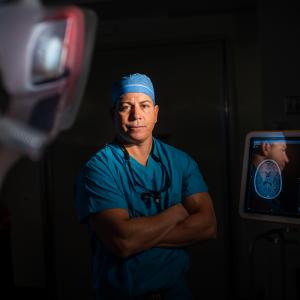Stavros N. Stavropoulos, MD, director of gastrointestinal endoscopy and the Advanced Endoscopy Program at NYU Winthrop Hospital, is using the world’s smallest microscope to view internal tissues at the cellular level in real time during endoscopies. Studies have shown that having this cell-by-cell view of the lining of the gastrointestinal (GI) tract and lungs can lead to improved detection and faster treatment of precancerous conditions.
NYU Winthrop is the first hospital on Long Island to offer this new advanced imaging technology, known as Cellvizio®, to at-risk patients during standard endoscopy procedures to detect signs of esophageal, colorectal, and bile or pancreatic duct abnormalities and pancreatic cancer.
“Until now, if we found areas that appeared abnormal during endoscopic procedures, we would often take random tissue samples and send them to a laboratory for analysis,” explained Dr. Stavropoulos. “With this new system, we can look at tissue at a microscopic cellular level right there in the endoscopy suite during the procedure. The old process is often imprecise, inefficient, and can take up to a week. Patients often have to come in for additional therapeutic procedures at a later date. With Cellvizio®, we have a tool that provides us with a closer view of the lining of the GI tract in real time, a sort of ‘optical biopsy’ so we have more information to help us guide expeditious treatment planning at the same endoscopic session. With Cellvizio®’s cellular-level views, we have more visual information about internal tissues at the patient’s bedside than ever before.”
A seventy-seven-year-old patient from Merrick, NY, has struggled with Barrett’s esophagus, a disorder in which the lining of the esophagus is damaged by stomach acid, for nearly a decade. Recently, a routine surveillance endoscopy revealed a nodular area in her esophagus and biopsies determined it to be a low grade dysplasia, or abnormality. She was referred to Dr. Stavropoulos for further evaluation and management.
Dr. Stavropoulos performed an endoscopic ultrasound (EUS)—an imaging procedure that combines endoscopy and ultrasound to obtain images of the digestive tract and surrounding tissue and organs. The EUS confirmed the presence of the lesion and with the help of innovative Cellvizio® confocal endomicroscopy, the lesion was determined to be cancerous.
“The Cellvizio® technology helped detect a previously unsuspected T1 carcinoma and changed our approach to treatment,” said Dr. Stavropoulos, who successfully removed the lesion via endoscopic submucosal dissection (ESD), an advanced resection technique to address superficial cancerous lesions of the gastrointestinal tract.
Today, just weeks after the procedure, the patient couldn’t be happier with the results.
“I feel terrific,” said the patient, who also praised Dr. Stavropoulos and NYU Winthrop for the outstanding care she received.
A growing body of published clinical data shows that by adding Cellvizio® to colonoscopies, endoscopies, and a standard pancreatic and bile duct exams, physicians have been able to more accurately differentiate cancerous and precancerous changes in tissue. In some cases, physicians have been able to perform minimally invasive treatments for conditions that traditionally required major surgical operations because of the improved view and understanding of the extent and stage of precancerous lesions and early cancers.
To use Cellvizio®, the tiny microscope is threaded through a traditional endoscope like a catheter or biopsy forceps, while the patient is undergoing an endoscopy. The microstructure of the digestive tract appears in real time on a monitor under the administration of a contrast agent called fluorescein, which allows the physician to recognize typical features of healthy and diseased tissue. It adds only a few minutes to the standard endoscopic exam and has a proven safety record with no adverse events reported in thousands of cases.
NYU Winthrop Hospital is one of about 50 centers in the United States using the Cellvizio® confocal probe. Cellvizio® is cleared by the U.S. Food and Drug Administration for use in the GI tract and lungs.
Medical conditions of the digestive tract severely affect quality of life and may even be life threatening. At NYU Winthrop’s Institute for Digestive Disorders, caring, compassionate physicians use the latest technologies to accurately diagnose and effectively manage these problems. Experienced NYU Winthrop physicians and researchers, with specific areas of expertise in gastroenterology, hepatology, and nutrition, offer a full range of services, including colon cancer screening, diagnosis, and staging of gastrointestinal malignancies such as esophageal, pancreatic, and stomach cancer, treatment of irritable bowel syndrome, liver disease, peptic ulcer disease, abdominal pain, gallbladder or gallstone problems, and heartburn or reflux.

